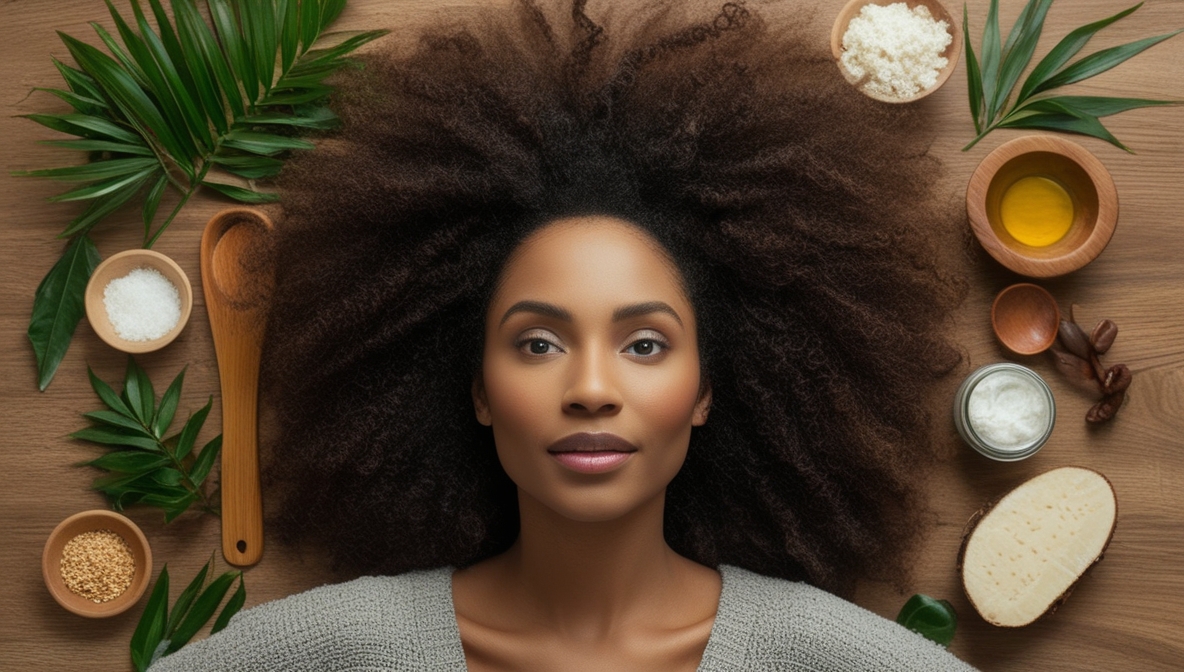Starting a natural hair care routine can feel overwhelming, especially for beginners. With so much information out there, it can be tough to know where to start. But don’t worry! This guide will walk you through the essentials of caring for your natural hair, helping you build a routine that works for you.
Understanding Your Hair Type for a Natural Hair Care Routine

Understanding your hair type is the first step in creating a successful natural hair care routine for beginners. Hair types generally fall into four categories: straight, wavy, curly, and coily. Each type has its unique characteristics and requires different care techniques.
For example, if you have curly hair, you might find it more prone to dryness. On the other hand, straight hair may get oily faster. To determine your hair type, take a moment to observe your strands when they’re dry and clean. Ask yourself:
– Is it straight, wavy, curly, or coily?
– Does it feel coarse or fine?
– How does it react to humidity or products?
Once you know your hair type, you can tailor your natural hair care routine to meet its specific needs. This personalized approach ensures your hair receives the right moisture and protein balance, leading to healthier and more manageable locks. Remember, understanding your hair is like knowing your best friend; it helps you make the right choices!
Essential Products for Your Beginner Natural Hair Care Journey

Navigating the world of hair products can feel like trying to find a needle in a haystack, especially when starting out. Fear not! Here’s a list of essential products every beginner should have in their natural hair care routine:
– Sulfate-Free Shampoo: Gentle cleansers that won’t strip your hair of natural oils.
– Moisturizing Conditioner: Look for ones that hydrate and detangle your hair.
– Leave-In Conditioner: Keeps your hair moisturized throughout the day.
– Hair Oils: Coconut or jojoba oil can work wonders for sealing in moisture.
– Styling Cream or Gel: Helps define curls or hold styles without the crunch!
As a beginner, it’s best to start simple. You don’t need a hundred products to achieve great hair. Focus on quality over quantity, and don’t be afraid to experiment to see what works for your unique hair type. Finding the right products can feel like dating—there may be a few flops before you find “the one”!
Step-by-Step Guide to Washing and Conditioning Natural Hair

Washing and conditioning your hair is a crucial part of any natural hair care routine for beginners. Here’s a step-by-step guide to ensure you’re doing it right:
1. Pre-Poo: Apply a moisturizing oil to your hair before washing. This helps protect your strands from becoming too dry.
2. Shampoo: Use a sulfate-free shampoo. Focus on your scalp and let the suds rinse down your hair.
3. Condition: Apply a generous amount of conditioner, focusing on the ends. Use a wide-tooth comb to detangle gently.
4. Rinse: Rinse your hair thoroughly with cool water to seal in moisture.
5. Leave-In Conditioner: After towel-drying, apply your leave-in conditioner for added hydration.
By following this routine, you’ll help maintain your hair’s natural moisture balance. Think of your hair like a sponge—if it’s too dry, it won’t absorb anything good! Remember, consistency is key, so aim to wash and condition your hair every 1-2 weeks, depending on your hair type and lifestyle.
Nurturing Your Natural Hair: Tips for Healthy Growth and Care

To ensure your natural hair flourishes, consider these tips to nurture it effectively:
– Protective Styles: Styles like braids, twists, or buns can prevent damage and promote growth.
– Regular Trims: Snipping away split ends can keep your hair looking healthy and vibrant.
– Hydration is Key: Drink plenty of water and use hydrating products to keep your hair moisturized.
– Limit Heat: Try to avoid excessive heat styling; if you must, use a heat protectant.
Nurturing your hair is like tending to a garden. You need to be patient and consistent to see growth, but the results are worth it! How about treating your hair to a DIY mask once in a while? Your hair will thank you with added shine and softness!
Starting a natural hair care routine can feel overwhelming, especially for beginners. With so much information out there, it can be tough to know where to start. But don’t worry! This guide will walk you through the essentials of caring for your natural hair, helping you build a routine that works for you.
Understanding Your Hair Type for a Natural Hair Care Routine

Understanding your hair type is the first step in creating a successful natural hair care routine for beginners. Hair types generally fall into four categories: straight, wavy, curly, and coily. Each type has its unique characteristics and requires different care techniques.
For example, if you have curly hair, you might find it more prone to dryness. On the other hand, straight hair may get oily faster. To determine your hair type, take a moment to observe your strands when they’re dry and clean. Ask yourself:
– Is it straight, wavy, curly, or coily?
– Does it feel coarse or fine?
– How does it react to humidity or products?
Once you know your hair type, you can tailor your natural hair care routine to meet its specific needs. This personalized approach ensures your hair receives the right moisture and protein balance, leading to healthier and more manageable locks. Remember, understanding your hair is like knowing your best friend; it helps you make the right choices!
Essential Products for Your Beginner Natural Hair Care Journey

Navigating the world of hair products can feel like trying to find a needle in a haystack, especially when starting out. Fear not! Here’s a list of essential products every beginner should have in their natural hair care routine:
– Sulfate-Free Shampoo: Gentle cleansers that won’t strip your hair of natural oils.
– Moisturizing Conditioner: Look for ones that hydrate and detangle your hair.
– Leave-In Conditioner: Keeps your hair moisturized throughout the day.
– Hair Oils: Coconut or jojoba oil can work wonders for sealing in moisture.
– Styling Cream or Gel: Helps define curls or hold styles without the crunch!
As a beginner, it’s best to start simple. You don’t need a hundred products to achieve great hair. Focus on quality over quantity, and don’t be afraid to experiment to see what works for your unique hair type. Finding the right products can feel like dating—there may be a few flops before you find “the one”!
Step-by-Step Guide to Washing and Conditioning Natural Hair

Washing and conditioning your hair is a crucial part of any natural hair care routine for beginners. Here’s a step-by-step guide to ensure you’re doing it right:
1. Pre-Poo: Apply a moisturizing oil to your hair before washing. This helps protect your strands from becoming too dry.
2. Shampoo: Use a sulfate-free shampoo. Focus on your scalp and let the suds rinse down your hair.
3. Condition: Apply a generous amount of conditioner, focusing on the ends. Use a wide-tooth comb to detangle gently.
4. Rinse: Rinse your hair thoroughly with cool water to seal in moisture.
5. Leave-In Conditioner: After towel-drying, apply your leave-in conditioner for added hydration.
By following this routine, you’ll help maintain your hair’s natural moisture balance. Think of your hair like a sponge—if it’s too dry, it won’t absorb anything good! Remember, consistency is key, so aim to wash and condition your hair every 1-2 weeks, depending on your hair type and lifestyle.
Nurturing Your Natural Hair: Tips for Healthy Growth and Care

To ensure your natural hair flourishes, consider these tips to nurture it effectively:
– Protective Styles: Styles like braids, twists, or buns can prevent damage and promote growth.
– Regular Trims: Snipping away split ends can keep your hair looking healthy and vibrant.
– Hydration is Key: Drink plenty of water and use hydrating products to keep your hair moisturized.
– Limit Heat: Try to avoid excessive heat styling; if you must, use a heat protectant.
Nurturing your hair is like tending to a garden. You need to be patient and consistent to see growth, but the results are worth it! How about treating your hair to a DIY mask once in a while? Your hair will thank you with added shine and softness!